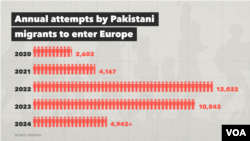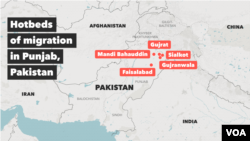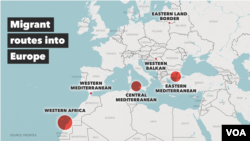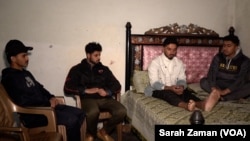When Amir Ali left the narrow alleys of his village in Pakistan’s Punjab province last summer for Spain, he thought his dream of a better life was finally coming true. The 21-year-old had failed seven times before to get a visa for countries in Europe and the Middle East.
Six months later, in mid-January, Ali was one of 22 Pakistani men whom Moroccan authorities rescued from a stranded migrant boat in the Atlantic Ocean off the coast of West Africa.
At least 43 Pakistanis were among 50 men who perished from hunger, dehydration and physical torture at the hands of human smugglers.
Limping with an injured foot in his home in Gujranwala district, Ali said he felt lucky to be alive.
“It’s not as if we survived because of some food or water,” he said. “Not at all. It’s just that God wanted to save us, so we survived.”
Since December 2024, dozens of Pakistanis have died as boats carrying migrants to Europe have run into accidents.
While Pakistan does not rank among the top 10 countries from which migrants attempting irregular entry into Europe come, thousands of its nationals risk their lives every year to reach the continent.
Human smugglers are becoming savvy too, officials say, as kingpins move to evade an ongoing crackdown, and rely on digital currencies to transfer the proceeds of their crime.
A harrowing journey
Ali traveled 1,200 kilometers south of Gujranwala to Karachi, where he boarded a plane to Senegal on a visa that smugglers had arranged.
“I didn’t even know that a country with that name existed,” Ali told VOA.
From Senegal he obtained a visa to enter Mauritania, where he stayed in a safe house with dozens of other migrants for almost five months.
The dream journey was turning into a nightmare.
“There were so many boys in one room, there was no room to sit,” Ali said. “It was mentally very tough.”
In the wee hours of the morning on Jan. 2, he was stuffed with more than 80 others on a boat headed from Nouakchott, Mauritania, to Spain’s Canary Islands.
After a day of travel, the boat ran out of fuel. To lighten the load, Ali said, the smugglers threw away the passengers’ belongings and took away their meager rations.
“On the fourth day on the boat, a man went crazy because of hunger. He jumped into the ocean. We all got very scared thinking about what was going to happen next,” Ali said.
Smugglers, the survivor said, thrashed anyone who complained or didn’t comply.
“The smugglers told us to throw the dead bodies in the water,” said Ali. “When we refused, thinking how could we throw our brothers, they beat us up a lot.”
The ordeal ended almost two weeks later when Moroccan authorities rescued the survivors after a fishing boat spotted them.
Ali’s family sold livestock and precious agricultural land and took loans to raise $10,000 to get their son to Spain. His mother is worried about the debt but delighted that her son is alive.
Who is leaving and why
Almost two hours away in Gujrat district of Punjab, Haji Shaukat Ali is devastated. His son Chaudhry Atif and nephew Chaudhry Sufyan did not survive.
A roadside sign leading to their village commemorates the two as martyrs.
“We sent them because of our weakness,” said Ali, sitting among a group of mourners, some of whom had come from Europe. “The weakness is money.”
Studies conducted by Gallup Pakistan and the Pakistan Institute of Development Economics, or PIDE, in recent years show lack of jobs as the primary reason for wanting to leave a country where economic growth is barely keeping up with population growth.
According to Pakistan’s Bureau of Emigration and Overseas Employment, more than 65,000 people left legally to work abroad just in January 2025. Between 2022 and 2024, an average of 800,000 nationals moved abroad for work annually. Most went to the Middle East but a few to Europe.
Pakistanis also made nearly 5,000 attempts to enter Europe illegally in 2024, data from the EU’s border and coast guard agency Frontex indicates.
Amir Ali’s home district of Gujranwala and Atif and Sufyan’s home district of Gujrat lead in migration trends, along with nearby Sialkot, Mandi Bahauddin and Faisalabad districts, despite being hubs of agriculture and industrial activity.
“They are not the poorest of the poor,” said demographer Durre Nayab, pointing to the ability of migrants from this region to pull together thousands of dollars to fund their journey.
“But it’s not just the financial aspect,” Nayab, who was involved in the PIDE study, told VOA. “The two other aspects that came out were lifestyle, and somehow, they thought they would gain more respect out of [the] country.”
Many Pakistanis wanting to leave felt poorly treated compared to their wealthier countrymen, Nayab explained.
“This difference made them disillusioned about the whole system,” the demographer said.
The PIDE study showed 37% of Pakistanis would leave, if given a chance.
Does life get better?
Kashif Ali, a cousin of the deceased Atif, spent hundreds of dollars to arrange a sponsor for a work permit to Italy a decade ago.
“In Pakistan, a middle-class laborer earns around $3 a day. For that same work, they make $20 to $25 overseas,” said Ali, who works in boat making.
His family in Pakistan now has a new home and a car.
Such a turn of fortune is on display across small towns and villages in central Punjab. Experts say it inspires many others to risk their lives to reach Europe.
It was a similar story of success that made Ishraq Nazir move from Mandi Bahauddin to Greece. He entered the European country after a brief stay in Turkey as a tourist in 2009.
It took him a decade to get a Greek residency permit after his asylum request was rejected.
For years he worked odd jobs like herding cows and painting trees to get by. Now he works in a packaging factory earning almost $60 a day and said he finally feels settled.
“I had to face a lot of difficulties, but the fact is that if I had stayed in Pakistan, I would have not gotten anything given the type of jobs they have,” Nazir told VOA on the phone while packing disposable plates. “My friends are still where they started.”
Umar Shaid from district Sialkot arrived illegally in Greece by boat from Libya in October.
“I am struggling. It’s very hard to find work. There are very few opportunities. I don’t have any friends or relatives to seek help from,” Shaid said by phone over the sound of the Athens metro.
Shaid said he has spent around $15,000 to pay smugglers and take care of his day-to-day expenses.
“Honestly, I believed the stories people told me and took this silly decision,” said Shaid. Still, he said he was not planning to go back to Pakistan.
Crackdown on smugglers
Pakistan began cracking down on human smuggling after hundreds of its nationals died off the coast of Pylos, Greece, in June 2023 in one of the worst migrant boat disasters.
A report by Pakistan’s National Commission for Human Rights says after that disaster, authorities arrested 854 suspected human smugglers.
Frustrated by recent incidents, Prime Minister Shehbaz Sharif formed a high-level task force in January, with himself as the head, to combat human smuggling.
The Federal Investigation Agency, or FIA, has ramped up efforts, arresting dozens of alleged human smugglers and confiscating the assets of others to force them out of hiding.
“For the first time we have seen that they [smugglers] are using Bitcoin and digital currency. They have shifted away from traditional ways of money laundering.” Bilal Tanvir, FIA deputy director for the Gujrat region, told VOA.
However, he said a lack of resources and low rate of conviction of alleged criminals posed a challenge in curbing the crime.
The FIA is also facing increased scrutiny. Sharif’s government removed the agency head three weeks ago. More than 100 officials have been fired, suspended or blacklisted for alleged involvement in and insufficient action against human smuggling.
Survivor Ali told VOA his group of migrant men faced no hurdle boarding the flight for Senegal at the Karachi airport.
“Someone connected with the agents came, held our hand and told us to come after him. Wherever we went, we followed him,” Ali said. “Nobody stopped us.”
Tanvir defended his agency, saying officers focus on those entering the country more than those on their way out.
The impact of tragedies
Surrounded by friends and neighbors, Ali looked disappointed. He told VOA he would not recommend attempting to reach Europe by boat.
Others in the room felt differently.
“Why should I lie?” said Tariq Bajwa, who supports his young sons’ plan to head to Europe illegally in a few years. “Looking at others, we are willing to try as well.”
Several young men in the room agreed.
Why Europe? “Just because,” said Hamza Qayyum, the son of a farmer. “There’s farming in Europe. I don’t feel like it doing it here,” the 20-year-old with a sixth-grade education explained.
Asked if they would risk drowning in the sea, Muhammad Zohaib, whose brothers work in the Middle East asked, “Why not?”
“Planes crash too, so what’s the big deal if a boat sinks?” the 20-something said. “One can run into an accident right outside the house.”







